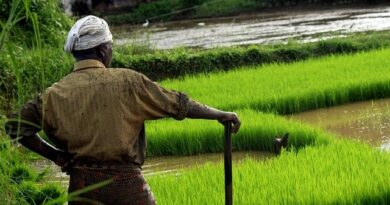SAMARTH Initiative
Context:
Recently, on the occasion of International Women’s Day 2022, the Union Minister for Micro, Small and Medium Enterprises (MSMEs), launched a Special Entrepreneurship Promotion Drive for Women –“SAMARTH”
Under the Samarth initiative of the Ministry, following benefits will be available to aspiring and existing women entrepreneurs:
- 20% Seats in free Skill Development Programs organized under skill development schemes of the Ministry will be allocated for Women. More than 7500 women will be benefitted.
- 20% of MSME Business Delegations sent to domestic & international exhibitions under the schemes for Marketing Assistance implemented by Ministrywill be dedicated to women owned MSMEs.
- 20% Discount on annual processing fee on NSIC’s Commercial Schemes
- Special Drive for registration of women-owned MSMEsunder Udyam Registration
Through this initiative, Ministry of MSME is focusing on providing Skill Development and Market Development Assistance to women and more than 7500 women candidates from rural and sub- urban areas will be trained in the FY 2022-23. Besides, thousands of women will be getting marketing opportunities to showcase their products in domestic and international exhibitions.
Also, to enhance the participation of women entrepreneurs in Public Procurement, a special discount of 20% shall also be offered on annual processing fee on NSIC’s following commercial schemes during the year 2022-23:
Contents
About Samarth Scheme:
The ‘Scheme for Capacity Building in Textile Sector (SCBTS)’ shall be known by the name “समर्थ (Samarth)”, signifying the broad objective of the scheme to skill the youth for gainful and sustainable employment in the textile sector.
Objectives
- To provide demand driven, placement oriented National Skills Qualifications Framework (NSQF) compliant skilling programmes to incentivize and supplement the efforts of the industry in creating jobs in the organized textile and related sectors, covering the entire value chain of textile, excluding Spinning and Weaving.
- To promote skilling and skill upgradation in the traditional sectors of handlooms, handicrafts, sericulture and jute.
- To enable provision of sustainable livelihood either by wage or self employment to all sections of the society across the country.
- The Scheme would target to train 10.00 lakh persons (9 lakhs in organised & 1 lakh in traditional sector)
The skilling programmes would be implemented through following Implementing Agencies:
- Textile Industry.
- Institutions/Organization of the Ministry of Textiles/State Governments having training infrastructure and placement tie-ups with textile industry.
- Reputed training institutions/ NGOs/ Societies/ Trusts/ Organizations/ Companies /Start Ups / Entrepreneurs active in textile sector having placement tie-ups with textile industry.
To read more about Samarth Initiative: Click Here….
Key Facts about International Women’s Day
THEME: ‘Gender equality today for a sustainable tomorrow’.
- Background: Women’s Day was first observed in 1911 when a conference comprising 100 women from 17 countries, with unions, socialist parties, working women’s clubs and female legislators unanimously approved the same.
- Zetkin, a feminist and labour leader, proposed at a conference that Women’s Day be celebrated in every country on February 28.
- However, in 1913, the date was changed to March 8, and it continues to be celebrated every year.
- About: International Women’s Day is a day dedicated to women, a symbolic reminder of the historic journey they have taken globally to better their lives, and that while a lot has been achieved on that front, the journey is still long and more needs to be done.
- International Women’s Day Date: International Women’s Day is celebrated each year on March 8. This year, it falls on a Tuesday.
Related Data:
- According to the UN, legal restrictions have kept 2.7 billion women from accessing the same choice of jobs as men.
- As of 2019, less than 25% of parliamentarians were women.
- One in three women experience gender-based violence.
- In 2019, before the Covid-19 pandemic, female labour force participation in India was 20.5%, according to International Labour Organisation (ILO) estimates. Comparable estimates for males was 76%.
- In the World Economic Forum’s Global Gender Gap Index (which measures progress towards gender parity), India is one of the worst performers in South Asia, it is now ranked 140 among 156 countries in 2021.
- As per the National Family Health Survey (NFHS)-5, as many as 57% women aged 15-49 were anaemic in 2019-21, compared to 53% in 2015-16.
What are the Safeguards for Women in India?
- Constitutional Safeguards:
- Fundamental Rights: It guarantees all Indians the right to equality (Article 14), no discrimination by the State on the basis of gender (Article 15(1)) and special provisions to be made by the State in favour of women (Article 15(3)).
- Fundamental Duties: The Constitution imposes a fundamental duty on every citizen through Articles 51 (A)(e) to renounce practices derogatory to dignity of women.
- Legislative Framework:
- Protection of Women from Domestic Violence Act, 2005: It provides victims of domestic violence with a means for practical remedy through prosecution.
- The Dowry Prohibition Act, 1961: It prohibits the request, payment or acceptance of a dowry.
- The Sexual Harassment of Women at Workplace (Prevention, Prohibition, and Redressal) Act, 2013: This legislative act seeks to protect women from sexual harassment at their place of work.
- Related Schemes: Mahila e-haat, Women Technology Park, Gender Advancement for Transforming Institutions (GATI), etc.
World Conferences on Women
- The UN has organised 4 world conferences on women. These took place in
- Mexico City, 1975
- Copenhagen, 1980
- Nairobi, 1985
- Beijing, 1995
- The 4th World Conference on Women (WCW), held in Beijing, was one of the largest ever gatherings of the UNs, and a critical turning point in the world’s focus on gender equality and the empowerment of women.
- The Beijing Declaration is an agenda for women’s empowerment and considered the key global policy document on gender equality.
- It sets strategic objectives and actions for the advancement of women and the achievement of gender equality in 12 critical areas of concern like women and health, women in power and decision-making, the girl-child, women and the environment.
- Recently, the United Nations Development Programme (UNDP) has proposed a Temporary Basic Income (TBI) for poor women in developing countries to help them cope with the effects of the coronavirus pandemic and alleviate the economic pressures they face every day.
Source: PIB
You can find many articles on SCHEMES (part of GS II) in our website. Go through these articles share with your friends and post your views in comment section.
Discover more from Simplified UPSC
Subscribe to get the latest posts sent to your email.



